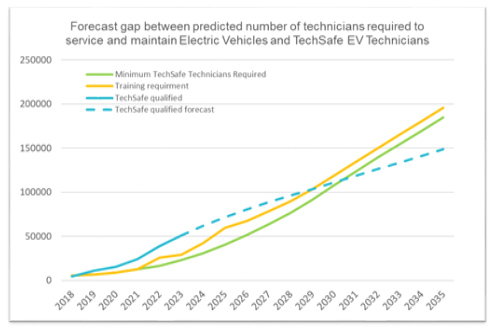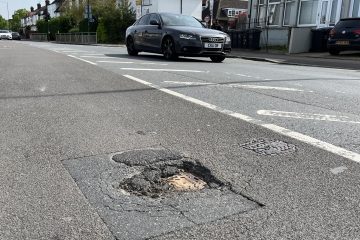The number of EV qualified technicians in the UK continues to grow, but the pace appears to be slowing despite the number of electric vehicles in the UK car parc rising each month.
The latest data from the Institute of the Motor Industry (IMI), has revealed that 20% of the UK aftermarket population is now qualified to work, to some level, on electric vehicles. In the second quarter, 2,900 technicians achieved EV certification, bringing the total number of EV qualified technicians in the UK to 45,300.
However, the rate of EV qualifications appears to be slowing, with a 36% decline in certifications year-on-year. And compared to the previous six-months there is a 26% drop in certifications. Early analysis by the IMI of Q3 data suggests that this trend is persisting with a 7% decrease compared to the same period in 2022.
Is uncertainty affecting EV qualified technician training?
“It is perhaps not surprising, given the enormous amount of uncertainty in the early part of this year about the internal-combustion engine new-car ban, that individuals working in the sector and their employers have taken their foot off the pedal on EV training. It also appears that training budgets may be among the first to be cut in the face of challenging economic conditions,” commented Emma Carrigy, Research Manager at the IMI.
The delay in the ICE ban, recently announced by the UK government, means another five years of petrol and diesel models being sold as new cars. While this seems like a stay of execution, however, the new Zero Emission Vehicle Mandate places strict sales requirements on carmakers, with 80% of their new-vehicle sales in 2030 needing to be zero-emission models.
Therefore, the stay-of-execution is only brief, and the need for electric vehicle sales will increase as the decade rolls on. Therefore, while only around two million vehicles in the UK parc are electrified, this will increase rapidly. Indeed, EVs made up 37.3% of registrations in September, and have maintained a share of over a third of the market across the year to date.
This means that training staff to become EV qualified technicians is still as important as ever. According to the IMI data, while early uptake in training was concentrated in dealerships, training providers and roadside assistance services, demand has been slower to materialise in the independent sector. The smaller businesses appear unable to invest in training on a drivetrain that they have not yet seen much in their workshops.
However, the reality is, as the EV parc increases and ages it is critical that consumers have confidence that they can take their electric vehicle where they choose and not be limited to the franchised dealer sector.
“The biggest concern the IMI has is the mixed messages being sent to employers and individuals within the automotive sector”, concluded Carrigy. “This ambiguity could stifle the commitment to training, which is crucial for road safety and economic stability. Fleet buyers, who account for 50% of new EV sales, are likely to sustain demand for EV-trained technicians due to corporate Environmental, Social, and Governance (ESG) targets.
“However, if the automotive workforce cannot see immediate returns on EV training investments due to consumer hesitation, the existing skills gap will widen, leading to longer repair wait times and potential economic and social mobility setbacks.”

The IMI predicts that by 2030 the sector will need 107,000 EV qualified technicians, increasing to 126,000 by 2032, and then to to 185,000 by 2035. Considering the current dampening in the take-up of EV qualifications and the current challenges posed by vacancies and economic pressures, the IMI forecast for the take-up of EV qualifications eligible for TechSafe has been adjusted. Projections indicate a potential shortfall of qualified technicians by 2030, which could reach 13,000 by 2032 if the current trends persist.
The IMI is currently running a game-changing campaign – There’s More to Motor – to change perceptions of the career opportunities in automotive and help the industry appeal to a broader audience. Find out more by clicking here.




You must be logged in to post a comment.